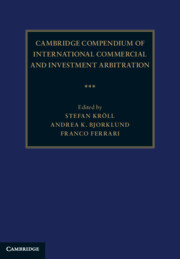Book contents
- Cambridge Compendium of International Commercial and Investment Arbitration
- Cambridge Compendium of International Commercial and Investment Arbitration
- Copyright page
- Contents
- Figures
- Tables
- Contributors
- Preface
- Part I Foundations
- Part II Public Law Questions Relating to Arbitration
- Part III Stakeholders in Arbitration
- Part IV Applicable Law
- 16 International Commercial Arbitration and Private International Law
- 17 Lex Arbitri and the Rules of Procedure
- 18 Applicable Law in Commercial Arbitration
- 19 Applicable Law in International Investment Arbitration
- 20 The Emergence of Soft Law as an Applicable Source of Procedural and Substantive Law
- 21 Mandatory Law: International Commercial and Investment Treaty Arbitration
- 22 Applicable Ethical Framework in Commercial and Investment Arbitration
- Part V Jurisdiction of the Arbitrator
- Part VI The Arbitral Tribunal
- Part VII Procedural Questions in Arbitration
- Part VIII Role of State Courts in Arbitration
- Part IX Awards
- Part X Post-Award Issues
- Part XI Legal Concepts
- Part XII Areas of Concern
- Part XIII Arbitration and Related Fields
- Part XIV EU Law and Arbitration
17 - Lex Arbitri and the Rules of Procedure
from Part IV - Applicable Law
Published online by Cambridge University Press: 18 February 2023
- Cambridge Compendium of International Commercial and Investment Arbitration
- Cambridge Compendium of International Commercial and Investment Arbitration
- Copyright page
- Contents
- Figures
- Tables
- Contributors
- Preface
- Part I Foundations
- Part II Public Law Questions Relating to Arbitration
- Part III Stakeholders in Arbitration
- Part IV Applicable Law
- 16 International Commercial Arbitration and Private International Law
- 17 Lex Arbitri and the Rules of Procedure
- 18 Applicable Law in Commercial Arbitration
- 19 Applicable Law in International Investment Arbitration
- 20 The Emergence of Soft Law as an Applicable Source of Procedural and Substantive Law
- 21 Mandatory Law: International Commercial and Investment Treaty Arbitration
- 22 Applicable Ethical Framework in Commercial and Investment Arbitration
- Part V Jurisdiction of the Arbitrator
- Part VI The Arbitral Tribunal
- Part VII Procedural Questions in Arbitration
- Part VIII Role of State Courts in Arbitration
- Part IX Awards
- Part X Post-Award Issues
- Part XI Legal Concepts
- Part XII Areas of Concern
- Part XIII Arbitration and Related Fields
- Part XIV EU Law and Arbitration
Summary
Lex arbitri (or ‘law of the arbitration’) is the law applicable to an international arbitration based upon the legal seat designated by the parties. The content of lex arbitri is dictated not by international law, but rather by the national law on international arbitration of the chosen jurisdiction. Typically, lex arbitri will address issues relating to the constitution of the arbitral tribunal and the conduct of the arbitration, including the extent to which local courts may be called upon to assist the arbitration process or may review and enforce any potential award, and the legal limits of arbitration in a jurisdiction.This chapter will consider the impact of lex arbitri on international commercial arbitration on the one hand and international investment treaty arbitration on the other.ICSID investment arbitrations are substantially ‘delocalized’ through the legal framework of the ICSID Convention, reducing their dependency on lex arbitri.By contrast, non-ICSID investment arbitrations are ‘localized’ in the seat of arbitration, and therefore are subject to lex arbitri.The direction of travel of international investment treaty proceedings, shown by complex bespoke procedural regimes in specific IIAs and negotiations for a Multilateral Investment Court, international investment disputes may ultimately ‘graduate’ out of dependence on lex arbitri.
Keywords
- Type
- Chapter
- Information
- Publisher: Cambridge University PressPrint publication year: 2023



